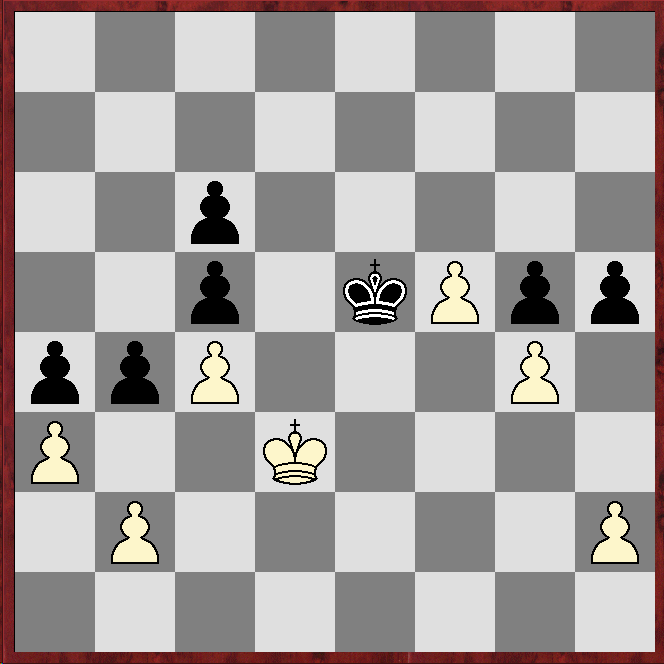Spanton (1884 ECF/1736 Fide) - Rowan Kent (1688 ECF/1355 Fide)
Spanish Exchange
1.e4 e5 2.Nf3 Nc6 3.Bb5 a6 4.Bxc6 dxc6 5.d4 exd4 6.Qxd4 Qxd4 7.Nxd4 Bc5 8.Be3 Nf6 9.f3 0-0 10.Nf5!? Bxe3?!
For comments, by me and Alexander Alekhine, on the moves so far, see my round-eight game earlier this month in Kraków.
11.Nxe3 Be6 12.Nc3 Rad8 13.Rad1 Rxd1+ 14.Kxd1 Rd8+!?
Black's drawing chances are probably improved by keeping a pair of rooks on the board, in which case this may be a waste of time.
15.Ke2 Kf8 16.Rd1 Rxd1
This is the top choice of Stockfish16 and Komodo14.1.
17.Nexd1
*****
*****
*****
*****
Black has the only long-range piece, but this is trumped by White's superior pawn-structure. The engines give White a slight edge.
17...Ke7 18.Ke3 Nd7 19.f4 f6 20.Nf2 Kd6 21.Nd3 Bc4 22.a3 Bxd3!?
Counterintuitive, but not necessarily bad. Certainly, in my experience, Spanish Exchange endings that get down to bishop and seven pawns versus knight and seven pawns are very difficult for Black to hold.
23.Kxd3 Nc5+ 24.Kd4 Ne6+ 25.Ke3 Nc5 26.Ne2 Ne6?!
The engines, especially Komodo14.1, are not overly unhappy about this, at least at first, but it lets White force a pawn-ending.
27.Nd4 Nxd4 28.Kxd4
*****
*****
*****
*****
White is winning, according to Stockfish16, but only has a slight edge, according to Komodo14.1. The former is almost certainly correct, but care needs to be taken to bring home the full point.
28...c5+ 29.Ke3 a5 30.c4!?
The engines much prefer 30.a4.
30...a4!?
Komodo14.1 now gives Black equality, although Stockfish16 reckons White has the upper hand.
31.g4?!
A slower approach, eg 31.Kf3, is probably advisable.
*****
*****
*****
*****
31...g5?
Both 31...h6 and 31...g6 give complete equality, according to the engines. The point, it seems, is White has no way to break into Black's position unless a corridor is created in the centre, which is exactly what the text allows.
32.e5+!? Ke6
32...fxe5? 33.fxg5 makes is easy for White.
33.exf6 Kxf6
*****
*****
*****
*****
34.f5?!
Not 34.fxg5+, which turns a win into a loss, eg 34...Kxg5 35.Kf3 Kh4 36.Kf4 Kh3 etc. However 34.Kf3 makes the win relatively straightforward, eg 34...h6 35.Kg3 c6 36.h4 etc, although the text is also good enough with perfect play (but see the next diagram).
*****
*****
*****
*****
38.Ke3
It seems only the engines' 38.Kc2!! wins, after which best-play continues something like 38...b3+ 39.Kd3 h6 40.Ke3 h5 (if 40...Kf6 then 41.Ke4 etc) 41.gxh5 Kxf5 42.h3 Ke5 43.Kf3 Kf5 44.Kg3 Ke5 45.h6 Kf6 46.Kg4 etc.
*****
*****
*****
*****
38...h6
The engines show both king retreats draw, eg 38...Kf6! 39.Ke4 b3 40.Ke3 Ke7!, the point being as soon as White plays Ke4 Black answers ...Kf6, preventing progress.
39.Kd3 h5
*****
*****
*****
*****
40.h3?
40.gxh5 wins in a similar way as to the note to White's 38th move, ie 40...Kxf5 41.h3 Ke5 42.Kf3 Kf5 43.Ke3 Ke5 44.Kg4 Kf6 45.h6 etc.
40...Kf4?
Presumably hoping for stalemate tricks, but Black had a draw with 40...hxg4 41.hxg4 Kf6, eg 42.Ke4 b3 43.Kd3 Ke7! etc.
The game finished:
41.f6 hxg4 42.hxg4 Kxg4 43.f7 Kh3 44.f8=Q g4 45.Qf1+ Kh2 46.Qf2+ Kh1 47.Qh4+ 1-0
Wessex B won the match 4.5-1.5.








No comments:
Post a Comment